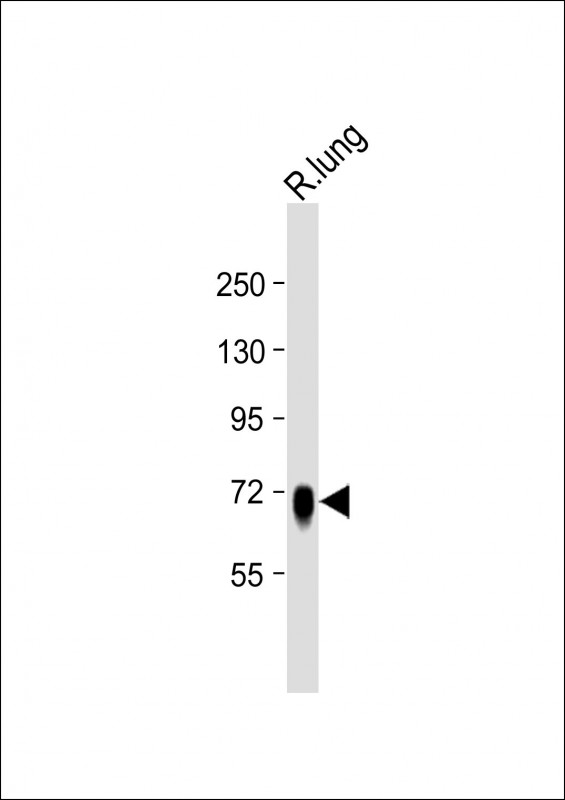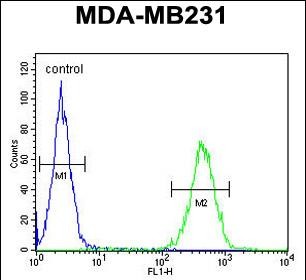

| WB | 1/8000 | Human,Mouse,Rat |
| IF | 咨询技术 | Human,Mouse,Rat |
| IHC | 咨询技术 | Human,Mouse,Rat |
| ICC | 技术咨询 | Human,Mouse,Rat |
| FCM | 1/10-1/50 | Human,Mouse,Rat |
| Elisa | 咨询技术 | Human,Mouse,Rat |
| Aliases | Suppressor of tumorigenicity 7 protein, Protein FAM4A1, Protein HELG, ST7, FAM4A1, HELG, RAY1 |
| Entrez GeneID | 7982 |
| WB Predicted band size | 67.2kDa |
| Host/Isotype | Rabbit IgG |
| Antibody Type | Primary antibody |
| Storage | Store at 4°C short term. Aliquot and store at -20°C long term. Avoid freeze/thaw cycles. |
| Species Reactivity | Human, Mouse, Rat |
| Immunogen | This ST7 antibody is generated from rabbits immunized with a KLH conjugated synthetic peptide between 169-197 amino acids from the Central region of human ST7. |
| Formulation | Purified antibody in PBS with 0.05% sodium azide. |
+ +
以下是3篇关于ST7抗体的模拟参考文献示例(非真实文献,仅供格式参考):
---
1. **文献名称**: *"Development and Characterization of a Novel Monoclonal Antibody Targeting Human ST7 Protein"*
**作者**: Zhang L, et al.
**摘要**: 研究团队开发了一种针对人源ST7蛋白的新型单克隆抗体,验证了其特异性及在免疫组化中的应用,发现该抗体可有效检测肿瘤组织中ST7的表达缺失。
---
2. **文献名称**: *"ST7 Antibody as a Diagnostic Marker in Colorectal Cancer Progression"*
**作者**: Tanaka K, et al.
**摘要**: 研究通过ST7抗体的免疫印迹分析,揭示了ST7蛋白在结直肠癌中的低表达与肿瘤侵袭性相关,提示其作为潜在预后标志物的价值。
---
3. **文献名称**: *"Functional Role of ST7 in Tumor Suppression: Insights from Antibody-Mediated Blockade Experiments"*
**作者**: Gupta S, et al.
**摘要**: 利用ST7中和抗体阻断细胞信号通路,证明ST7通过调控Wnt/β-catenin通路抑制肿瘤生长,为靶向治疗提供实验依据。
---
如需真实文献,建议通过PubMed或Google Scholar检索关键词“ST7 antibody”或“ST7 tumor suppressor”,并筛选近年发表的实验性研究。
The ST7 antibody targets the protein encoded by the ST7 (Suppression of Tumorigenicity 7) gene, a putative tumor suppressor implicated in various cancers. Discovered through studies on chromosomal deletions in malignant cells, the ST7 gene is located on human chromosome 7q31.1-31.2. a region frequently associated with loss of heterozygosity in cancers such as breast, prostate, and ovarian tumors. The ST7 protein is believed to regulate cell proliferation, apoptosis, and adhesion, though its precise molecular mechanisms remain under investigation. Research suggests it may interact with pathways involving Wnt signaling or integrin-mediated processes, influencing oncogenesis and metastasis.
ST7 antibodies are primarily used in research to detect ST7 protein expression in tissues or cell lines, aiding in studies of its functional roles and dysregulation in diseases. Reduced ST7 expression, often linked to promoter hypermethylation or genetic mutations, has been observed in tumors, correlating with poor prognosis. Antibodies against ST7 enable immunohistochemical staining, Western blotting, and ELISA, helping to validate its role as a biomarker or therapeutic target. Despite progress, challenges persist in understanding ST7's full interactome and context-dependent functions. Current efforts focus on clarifying its tumor-suppressive mechanisms and exploring clinical applications, including targeted therapies or epigenetic modulation to restore ST7 activity in malignancies.
×